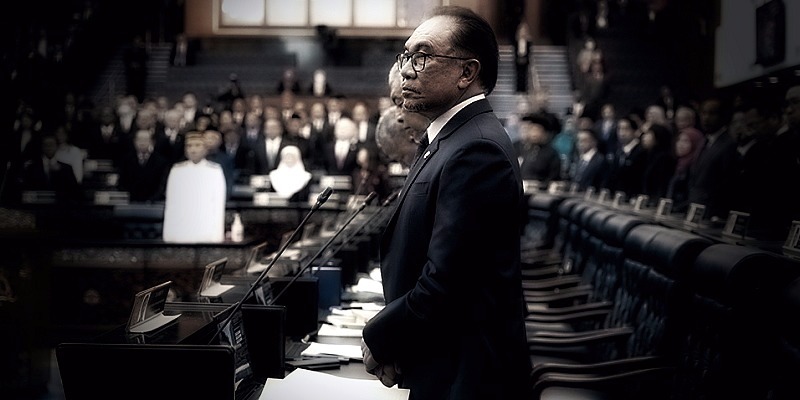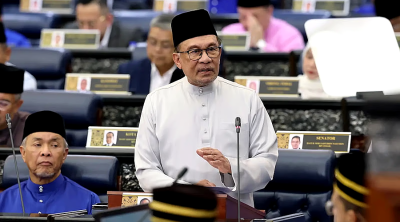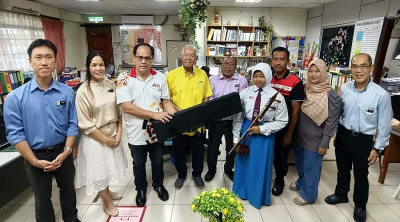We view the KPI prospects for Anwar’s administration with strong optimism, and believe he can remarkably lift the country’s economy within the next five years!
At 18:13 at the first sitting of the 15th parliament on Monday at Dewan Rakyat, PM Anwar Ibrahim won the vote of confidence by voice vote after minister in the PM’s department (law and institutional reform) Azalina Othman Said winded up the debate on the motion.
This means that Anwar will now enjoy the majority support of the Lower House to justify the legitimacy of his administration.
After the conclusion of the 15th general election, as none among the major coalitions of Pakatan Harapan, Perikatan Nasional and Barisan Nasional won more than half of the seats to rule alone, major camps initiated their power struggles to wrestle the support of other camps in order to put up a new government, giving the debilitated and vaguely divided Umno as well as undecided GPS the opportunity to become potential kingmakers.
In the end, as we all have known by now, Anwar had the last laugh!
November 24, Anwar said in his first press conference after taking office that he would make the motion of confidence for the PM his priority agenda when parliament reopens.
The reasons are very straightforward. Firstly, he did not want the opposition to keep exploiting their “lame duck PM” claim. Secondly, he wanted to declare to the world through such a motion of confidence that his unity government had the support of majority lawmakers, was stable and united.
And thirdly, the support from majority of MPs is a “precondition” for him to implement broad-based reforms over the next five years.
The “simple majority” commanded by Muhyiddin Yassin and Ismail Sabri has served to remind Anwar that this alone is not good enough to get things done!
Anwar’s insistence to push ahead a vote of confidence in Dewan Rakyat was not without its risks, as no one could guarantee that none of the Umno or GPS reps might switch sides during the vote, or absent themselves on a variety of excuses.
Foreseeing such probability, Pakatan on last Friday signed an MoU with parties in the unity government to ensure that the upcoming motion of confidence could be passed smoothly.
Rafizi Ramli, the PKR deputy president who orchestrated the signing of the agreement, insisted that the agreement was not dictatorship, as MPs were allowed to vote freely.
That being said, any MP found “leg-pulling” during a vote on the unity government’s legitimacy after the agreement has been signed will be automatically disqualified. As such, Rafizi’s promise was non-existent in essence, as anyone doing so could risk losing his or her MP status.

Earlier Monday morning, 221 MPs took part in the election of the new Dewan Rakyat Speaker, with the notable exception of deputy economy minister Hanifah Hajar Taib.
Johari Abdul won the vote 147 to 74, an outcome that foretold Anwar’s vote of confidence could be easily passed likewise.
But before the motion was eventually adopted by voice vote on the floor, a ferocious exchange of words took place among representatives from both sides of the divide.
Former PM Tun Mahathir said it was premature to assess the performance of Anwar Ibrahim at this juncture. Indeed, Anwar’s unity government has decided that this is not time yet to evaluate the competency of the ministers or deputy ministers. And since the cabinet was put up by Anwar, he is wholly responsible for its smooth functioning.
Malaysia has an excessively bloated 1.7-million civil service, posing a serious challenge for the department heads to effectively mobilize this enormous army of public servants to conscientiously serve the nation efficiently with zero corruption.
Verily it takes time to remold a healthy civil service culture in this country known for its lackluster frontline service, thus requiring the ministers to go down to the field to sort out the problems.
As soon as the cabinet has been installed and even before any major new administrative policies have been drawn up, the unity government has already started doing something, beginning with issues most pertinent to the day-to-day living of Malaysians, including their economic plight, suspected abuse of power involving the previous administrations (such as RM7 billion of projects in the RM14 billion flood mitigation allocations set aside in the 2023 Budget, as well as the alleged RM600 billion public fund misappropriation by the Muhyiddin-led PN government during the pandemic), and even investigations on the legality and safety of campsites across the country to prevent more landslides after last week’s Batang Kali tragedy.
With convincing support from the Lower House, Anwar can now boast a strong basis in drawing up his policies. He can now demand individual departments to submit quantifiable KPIs for regular performance tracking, and kickstart projects that will help ensure the country’s sustained development, including more robust economic expansion, taming runaway inflation, stabilizing the ringgit exchange rate, boosting employment and the people’s incomes, providing a comprehensive educational system, lifting the country’s public health and medical care services, luring foreign investments, capital inflow through the MM2H scheme, spearheading major public infrastructure projects that will benefit the rakyat as well as highly competitive core industrial development, among others.
We view the KPI prospects for Anwar’s administration with strong optimism, and believe he can remarkably lift the country’s economy within the next five years!
ADVERTISEMENT
ADVERTISEMENT








































